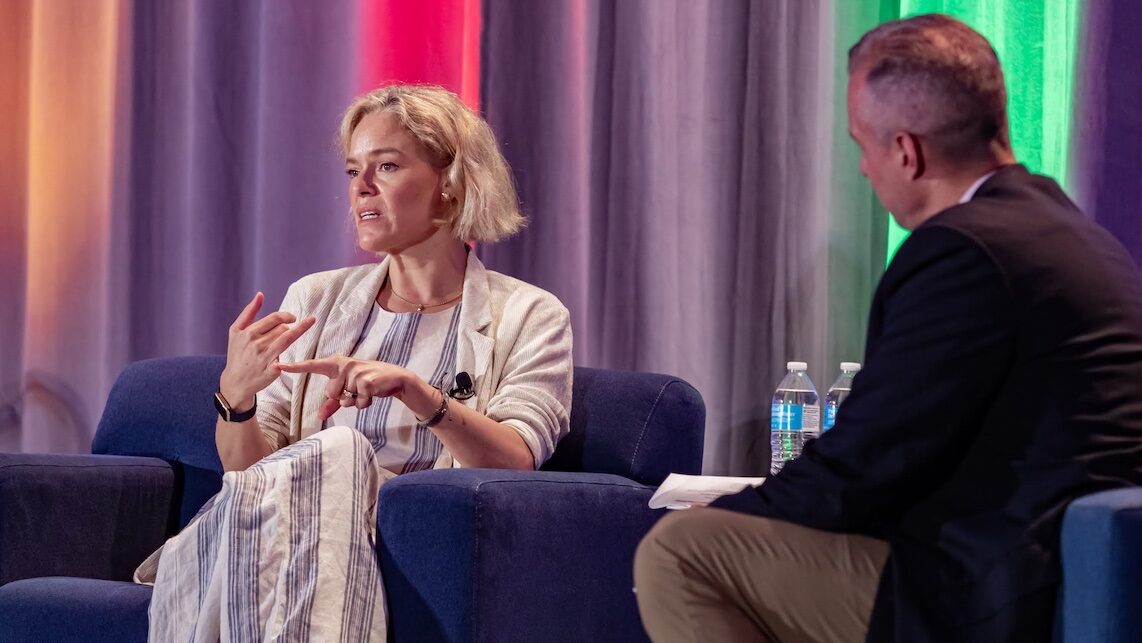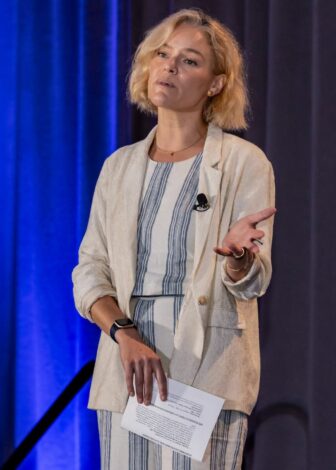NPR’s Katherine Maher tackles big questions about public media’s role

Robert Bruni, Ambience Photography / PMDMC 2024
NPR CEO Katherine Maher, left, and 'Morning Edition' co-host A Martínez during the Public Media Development and Marketing Conference in San Diego.
SAN DIEGO — New NPR CEO Katherine Maher believes in public media’s role to build a sense of a common public but sees “friction” in the audience experience that inhibits growth in listenership and revenues.
“I think we make our audience members jump through tremendous hoops to understand … who it is that we are and how it is that their contributions matter,” Maher said Tuesday during a keynote session at the Public Media Development and Marketing Conference in San Diego.
Maher’s address at Greater Public’s annual conference focused on questions she’s asking about the purpose of public media “in this moment” and what audiences want from the network.
During a Q&A with Morning Edition co-host A Martínez, Maher also alluded to the firestorm of controversy during her first weeks in the job when now-former NPR editor Uri Berliner complained about a lack of ideological diversity in the newsroom in an essay for The Free Press.
“We were asked some very pointed questions by a former member of our staff earlier this year,” Maher said. “My response is, it’s OK for us to be asked.”
Without going into many specifics, Maher said she did not like how it was done but said it is always OK for NPR to “answer pointed questions.”
“It is always appropriate for us to ask ourselves, ‘Are we doing the work that we need to do well?’” Maher said. “It is absolutely appropriate for us to have a hotwash on difficult stories and say, ‘Did we cover this as fully as we should have? Were there voices that we missed? What did we learn from this experience?’, and for us to have that same approach to all of the work that we do.”
“I think that that is actually a responsibility that we have if we are going to articulate some sort of hold on the public trust,” she added.
Responding to a question from the audience, Maher said she believed her gender played a role in the intense scrutiny she faced after taking the helm at NPR in March.
Maher was criticized for social media posts from years before she became NPR’s CEO, when she criticized President Donald Trump, according to an April story in the New York Times.
“I was seen as an easy target,” Maher said Tuesday.
What matters to the audience
In sharing her impressions from her first months in the job, Maher said she has been taking time to ask questions and learn before laying out her agenda. She told PMDMC attendees that she believes that public media’s role is to speak to and create “the idea of what the public actually is.”

“If you want people to believe that they are part of a common civic fabric, a common national fabric, you actually have to construct that,” Maher said. “You have to construct the idea of a nation in which we are in dialogue with one another, where we have more in common rather than less in common, where we are able to engage in constructive discourse around common ideas.”
During his Q&A with Maher, Martínez asked how NPR can make itself so valuable to member stations that they can clearly communicate that it’s worth their listeners’ financial support.
“This comes back to my view that we spend a lot of time trying to explain to the audience what matters to us as opposed to us talking about what matters to them,” Maher said. “I’m not sure that the audience cares whether they are donating to which corporate entity. I think that the audience cares about receiving the programming that they care about.”
Since joining NPR, Maher said she has been struck by the resources that go into explaining the complexities of the public radio system.
“If we want to be really thoughtful about how to grow audience, we need to be responsive to what matters to that audience,” Maher said. “To me, that is not necessarily how we explain the differentiation between … what works at our station and what works at NPR and how these things interrelate.”
“That is a level of complexity that is intellectually tidy, but not necessarily resonant or meaningful from a mission or utility or delight perspective,” she said.







I don’t think Maher is making sense. Do we program for what the public (audience) cares about, or explain to the public what “we” care about? The latter is pure nonsense or worse solipsism. NPR in the 90s worked hard to get away from producer-centered content and to pay attention to serving its audience. Is the CEO suggest ing NPR go back to that? I can’t tell. But the CEO of the smartest broadcast network should know how to make sense in public communication instead of blaming others.
She is a character right out of the pages of Orwell. Just one of her comments: she believes that public media’s role is to speak to and create “the idea of what the public actually is.”
Thank God we have been enlightened as to who we are. Can you imagine what she says in private?